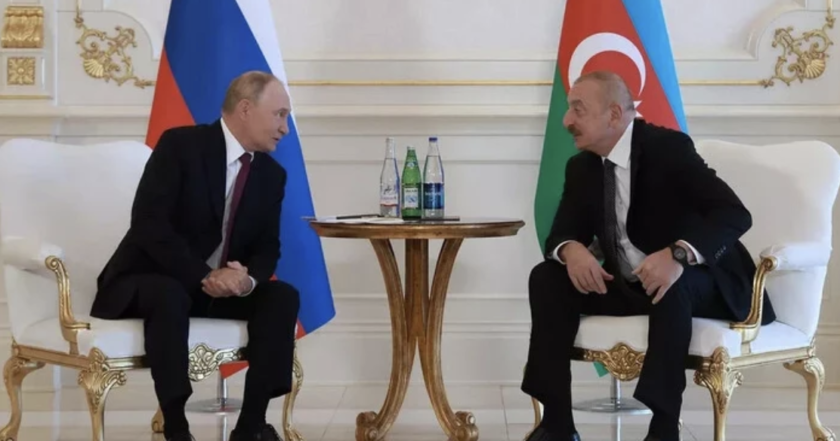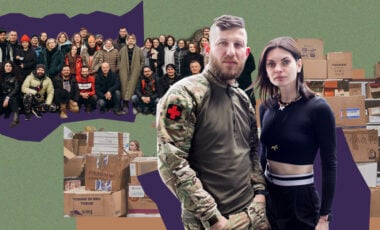Russian dictator's visit to Baku aims to divert attention from "uncomfortable situation" in Kursk region – ISW

Photo: open sources
Experts of the Institute for the Study of War (ISW) believe that the Kremlin's head, Vladimir Putin, went to Baku, allegedly demonstrating diplomatic activity, and tried to divert attention from the "uncomfortable situation" in the Kursk region.
The Institute for the Study of War (ISW) reported this.
According to analysts, Putin visited Azerbaijan on August 18, probably to divert attention from the Ukrainian invasion of the Kursk region and present himself as an allegedly consistently effective diplomat.
The report noted that Putin arrived in Baku on August 18 with a Russian delegation, including Foreign Minister Sergei Lavrov, on a two-day visit to meet with Azerbaijani President Ilham Aliyev to discuss Russian-Azerbaijani bilateral relations.
According to reports, the delegations discussed:
- bilateral energy relations,
- Russian-language initiatives in Azerbaijan,
- Russia's willingness to act as a mediator in the peaceful settlement of relations between Armenia and Azerbaijan.
"The timing of this visit is noteworthy given the ongoing situation in the Kursk region and the Kremlin's continued efforts to downplay the Ukrainian incursion's magnitude and impact.
Russian state media focused on Putin's trip to Azerbaijan, amplifying minute details, likely in part to divert attention from the uncomfortable situation in Russia by saturating the information space with a showcase of the Kremlin's global diplomatic engagement and alleged successes," the report reads.
The review also notes that Ukrainian troops continued to make small advances in the Kursk region on August 19 amid protracted fighting in the region.
Experts point out that the Kremlin's reaction to Ukraine's invasion of the Kursk region emphasized that the Kremlin's internal priorities are increasingly focused on the regime's stability, especially during the last year.
The Russian publication Vazhnie Istorii reported on August 19 that Putin's response to the "Kursk situation" revealed specific shifts in the Kremlin's power vertical, many of which have occurred over the past few months.
Putin has chosen his former bodyguard, Aleksey Dyumin, to head a "counter–terrorist" mission aimed at countering Ukrainian actions in the Kursk region. As highlighted by "Vazhnie Istorii," this move suggests that Putin lacks faith in the Russian General Staff and the Ministry of Defense (who are, in theory, responsible for defensive military operations) and instead relies on individuals he trusts.
The source informed "Important Stories" that Dyumin is currently at odds with representatives of the Russian President's Administration, signaling continued support from Putin for those in his personal favor.
"Vazhnye Istorii's reporting strongly suggests that the Kremlin has increasingly oriented its main priorities towards regime stability. ISW has reported at length on Putin's efforts to maintain a core cadre of loyal siloviki (Russian strongmen with political influence) within the Russian power vertical, particularly since the risks to Putin's regime were first introduced by the Wagner Group's armed rebellion in June 2023.
The Kremlin's general shift towards siloviki , such as Dyumin, whom Putin personally trusts, and security officials with strong and well-documented reputations in counterterrorism and counterintelligence, suggests that the Kremlin is increasingly looking towards such individuals as regime safeguards.
Ukraine's operation into the Kursk region has particularly exposed this dynamic, and the Kremlin's continued response to the incursion further emphasizes the ever-increasing reliance on security officials and structures over more politically or economically focused internal structures," ISW analysts note.
ISW key findings as of August 19:
- Ukrainian forces continued to marginally advance in the Kursk region on August 19 amid continued fighting throughout the Ukrainian salient in the area.
- Chechen Akhmat Spetsnaz Commander Apty Alaudinov aggravated a situation that the Kremlin has historically treated with extreme caution by calling for conscripts to participate in combat operations in the Kursk region and dismissing concerns from relatives of conscripts.
- Russian President Vladimir Putin visited Azerbaijan on August 18, likely to shift focus away from the Ukrainian incursion into the Kursk region and present himself as a continually effective diplomat.
- The Kremlin's response to Ukraine's incursion into the Kursk region has emphasized how the Kremlin's internal priorities have increasingly oriented towards regime stability, especially over the past year.
- Russian President Vladimir Putin signed a decree on August 19 further codifying a vague Russian state ideology into Russian law without concretely modifying the Russian Constitution. Putin's effort to codify a specific ideology may be intended to counter the Russian ultranationalist community's own efforts to establish an accepted national ideology.
- Russian officials continued attempts to falsely frame Ukraine as responsible for the lack of negotiations to end the war.
- Russian forces recently advanced near Kupiansk, Svatove, Pokrovsk, and Vuhledar.
- Local Sakhalin region media outlet Sakhalin Media reported on August 19 that the Russian Federal Security Service (FSB) Border Service in the Sakhalin region and other federal subjects within the Russian Far East, Northwestern, and North Caucasian federal okrugs has resumed conscription for the first time in an unspecified "long" length of time.
The third week of the Ukrainian military's operation in the Kursk region's territory has already begun. The International Institute for the Study of War stated in a recent report that Russia has transferred about 5,000 of its soldiers from the fronts in Ukraine to try to "recapture" territories in the Kursk region.
It should be added that Ukraine has no intention of seizing the territories of Russia's Kursk region but is focused on protecting the lives of its citizens and creating a buffer zone. In addition, the operation does not allow the enemy to transfer additional units to the Donetsk region, complicating their logistics.
























































